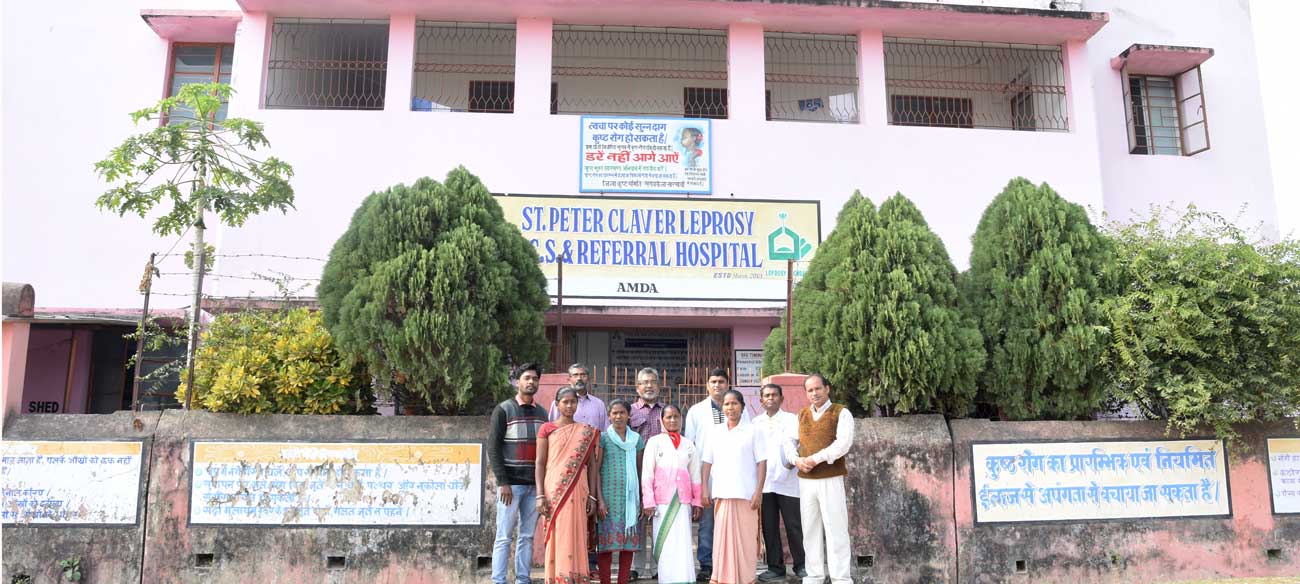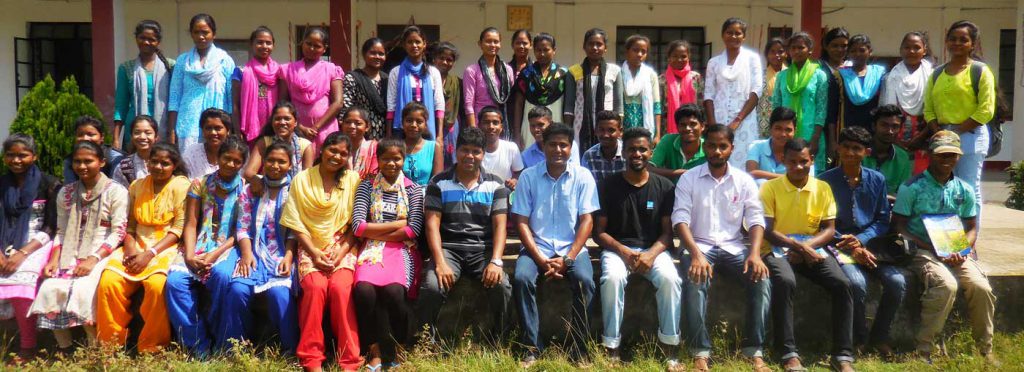
Social Ministry
Claver Social Welfare Centre, AMDA

Fr. Felix Tellis, SJ is the founding Father of Claver Social Welfare Centre (CSWC), Amda. The project of leprosy eradication programme began in 1982. It was started in three Blocks: Saraikela, Kharswan and Kuchai of the then Singhbhum district. The main activity was Survey, Educate and Treatment of the leprosy patients. As per the records, out of 19010 patients, 15506 patients were cured till 2002. From April 2002, Integration of Health Work was done. The main activity was the Capacity Building of the government health workers of eight Blocks of Saraikela-Kharswan district on leprosy detection and treatment. Health workers at Primary Health Centres (PHC) in these blocks too were given training.
In 2007 hospital building was completed. OPD service was the main work of the hospital. Specifically, it was for the leprosy patients. In the same year, CSWC started Disability Prevention and Medical Rehabilitation (DPMR) programme where our activity was Data Collection, Demonstration of self-care practices to disable patients together with training to government general health staff and Sahiyas. This programme was held in eight districts of Jharkhand: East Singhbhum, West Singhbhum, Saraikela-Kharswan, Simdega, Gumla, Lohardaga, Godda and Deoghar. All activities were being coordinated by CSWC’s hospital.
In May 2013, Re-Constructive Surgery (RCS) started. Hospital building was modified, and Operation Theatre was built, a room was converted into physiotherapy section. Hospital was named as St. Peter Claver Leprosy RCS and Referral Hospital. So far 297 patients have gone through the RCS till February 2020. It is done to correct hand claws, foot drops and lagophthalmos (eye). Patients for RCS come from six districts of Jharkhand: East Singhubhum, West Singhbhum, Saraikela-Kharswan, Simdega, Gumla and Lohardaga.
In 2015, Ulcer Ward was inaugurated. Ulcer patients are admitted for better care and treatment. So far 521 patients were admitted with ulcer and were healed from their ulcer. Micro Cellular Rubber (MCR) Chapals are given to foot anaesthetic patients fee of cost. From 2015 till date 342 patients were given MRC chappals.
Counseling: It is an important aspect of leprosy eradication programme. Through this the staffs counsel them for Self-Care and to remove social stigma which is in the patients. It boosts them to lead a dignified life.
Infrastructure: It is a 22 bedded hospital; 12 beds for RCS (six each for male and female) patients and 10 beds for ulcer (five each for male and female) patients. There is facility for the ordinary lab tests of leprosy patients like HB, TC/DC, RBS, blood grouping etc.
Special Activities: besides regular OPD and RCS programmes the following programmes are conducted by CSWC, Amda: (1) Leprosy awareness and case detection programme in schools started in 2017 (2) Leprosy awareness programme in villages started in 2018 and (3) Mother and Child Health Care program in villages and Anganwadi centres in five villages of Bhoya Gram Panchayat in collaboration with Nirmala Health Centre, Amda started 2019.
Nirmala Health Centre: It is part of CSWC and looks after the general health needs of the locality. This dispensary was started in 1990 and is looked after by SRA Sisters. From the beginning till April 2020 it has served 99,171 patients through OPD service, 14, 135 benefited from immunization programme, 1669 delivery took place and 4309 patients were admitted.
Besides lab test for malaria was done. Their contribution in general needs is commendable but now there are not many patients coming to the dispensary as there are health facilities by government is available free of cost.
TRTC, Guira

Tribal Research and Training Centre and Non Formal Education, initiated research on tribasl and indigenous people, documentation and non formal education, especially among rural people of Kolhan and Porhat areas of West Singhbhum and Saraikela- Kharsawan Districts. It also ventured into the project of mass literacy in these areas. The important objectives maybe defined as creating awareness among the rural people on socio political issues, instilling a sense of pride for their own language and culture. It has undertaken many Govt. aided Rural Projects. Recently a Kolhan Community College was opened to offer vocational training to the tribal youth and to organize the un organized youth in a movement called the Yuva Jumur.
Divyanugrah, Tumudibandha
OCI: Odisha Citizens’ Initiatives (OCI) has its inception after the Kandhamal communal riots in 2008 that wrecked havoc and widespread violence. Seeing the gravity of communal tension prevailing in the area at that point of time, the Jesuits – Praful Barla & Romanus Kerketta, and Mr. Ullash Muduli at Divyanugrah, Tumudibandha started OCI in 2009 and initiated the “Peace Building” process among the major caste groups like Kondhos, Panos and Gondos. As per Mr. Ullash who was from the beginning of OCI, “Under Mundigoda Panchayat the Gondo tribes have good link with and support of the RSS, form majority in Kumarpada, Dulimunda, Mondalapader, Dhungiapokar, Rugidapali and Budakhundev Peta villages whereas Panos (SCs) and Kondhos (ST) form major communities and many are Christians belong to Sindipokhar, Dhagirgaon, Kurtipada and Sesergaon villages. In Sesergaon two Christians were killed and many houses were burnt. Kondhos/Panos were frightened of the Gondos. There was no social interaction between them. Kondhos/Panos had stopped sending their children to school where Gondos are in majority. Without mentioning the problems such activities were introduced that helped in bringing the people to a common platform. By the year 2010-11, the results were very satisfying. Peace and harmony among different groups were restored”. Even today the caste feeling remains but religion based discrimination has reduced to a great extent.
From here, the Jesuits ventured into “Empowerment & Sustainable Livelihood Programme”. The devil makes a playground in the unengaged/lazy mind. Politicians/vested interests use such people for their purpose. The project, with the support of Missionprokur, Germany, picked up very well and continued from 2013 to 2017 in four Gram Panchayats, i.e., Mundigoda, Guma, Madaguda and Subarnagiri of Tumudibandha and Kotagarh Blocks respectively.
The main thrust of the project was to bring attitudinal change in people and empowering them through multiple sustainable livelihood activities, in convergence with the government-funded livelihood activities- agriculture, animal husbandry, horticulture, empowerment of women through SHGs, awareness building on education, training PRI members, youth training for social responsibility etc. For the year 2018 -20, Jamshedpur Jesuit Society supported the programme.
Lok Manch: Lok Manch – “Development and Access to Entitlements of the Marginalised”, a rights based programme is being implemented in 12 states of India through Delhi Samajik Vikas Kendra, ISI, Delhi. In the Lok Manch programme (LM), there are 92 civil society organisations (Jesuits, other religious and organisations belonging to other faiths) besides ISI Delhi, ISI Bangalore and Bagaicha, Ranchi.
It started in April, 2015 and is working towards empowering “Community Leaders” (CLs). The aim is that these CLs together with village level other stakeholders, will ensure that the people’s rights and entitlements like National Food Security Act (NFSA), SC/ST Sub-plan, Water Sanitation and Hygiene (WASH), and other government schemes are implemented in letter and spirit, leading to transformation in the lives of the people.
Along with OCI, there are 3 other partner organisations in Odisha. Each organisation has 2 staff for LM activities. This programme is operational in 16 Gram Panchayats of Kotagarh, Tumudibandha and Baliguda Blocks of Kandhamal district.
St. Mary’s Centre Chandankiyari
Chandankiyari is one of the very backward blocks of Bokaro District of Jharkhand state. De Noboli School, Digwadih is 15 Km away from St. Mary’s Centre Jamshedpur Jesuit Province initiated to purchase seventeen and half acres of land to start an English medium School in Chandankiyari . In the mean time the sisters of Holy Cross Congregation Hazaribag requested four acres of land to start a CBSE school in Chandankiyari. The School progressed faster.
There was a felt need for growing School to have Hostel for Boys. The Jesuits put up a hostel and accommodated about 150 boys of all Categories. A good standard is maintained in every sense. There are 10 Supportive Staff to look after the property of thirteen and half acres of land for Vegetables Garden and 70 Mango trees inside the property. It is fully Self- Sufficient. There are two Jesuits to look after the spiritual needs of the sisters. Moreover there is a Mass Centre 18 Km away to take care of 15 Catholic families. It is known as Bhojudih Railway Colony. On every Sunday, one of the priests offers Holy Mass for the Faithful.
